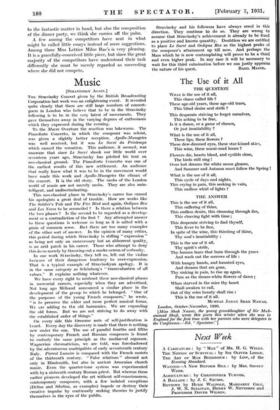Music
[STRAVINSKY AGAIN.]
THE Stravinsky Concert given by the British Broadcasting Corporation last week was an enlightening event. It revealed quite clearly that there are still large numbers of concert- goers in London who believe that to be in the Stravinsky following is to be in the very latest of movements. They gave themselves away in the varying degrees of enthusiasm which they expressed during the evening.
To the Mavre Overture the reaction was lukewarm. The Pianoforte Concerto, in which the composer was soloist, was given a slightly better reception. Apollo-Musagetes was well received, but it was Le Sacrd du Printemps which caused the sensation. This audience, it seemed, was unaware that since Le Sacrd shook our little world over seventeen years ago, Stravinsky has pitched his tent on neo-classical ground. The Pianoforte Concerto was one of the earliest results of this new settlement. An audience that really knew what it was to be in the movement would have made this work and Apollo-Musagetes the climax of the concert. It is the old story. The snobs of the London world of music are not merely snobs. They are also unin- telligent, and undiscriminating.
This neo-classical phase in Stravinsky's career has caused his apologists a great deal of trouble. How are works like The Soldier's Tale and The Fire Bird and again, Oedipus Rex and Les Races to be reconciled ? Is there a relation between the two phases ? Is the second to be regarded as a develop- ment or a contradiction of the first ? Any attempted answer to these questions is welcome so long as it is salted with a grain of common sense. But there are too many examples of the other sort of answer. In the opinion of many critics, this period during which Stravinsky is stifling " expression " as being not only an unnecessary but an abhorrent quality, is an arid patch in his career. Those who attempt to deny this do so merely by throwing out a smoke-screen of verbosity.
In one work Stravinsky, they tell us, left out the violins been use of their dangerous tendency to over-expression. That is a typical example of Stravinskyan apology. It is in the same category as Schonberg's "transvaluation of all values." It explains nothing whatever.
We have every right to mistrust these neo-classical phases in mercurial careers, especially when they are advertised. Not long ago Milhaud announced a similar phase in the development of the group to which he belonged. " One of the purposes of the young French composers," he wrote, " is to preserve the o Ider and more perfect musical forms. We are adding to the old harmonies. We are expanding the old forms. But we are not striving to do away with the established order of things."
On every side this tiresome note of self-justification is heard. Every day the discovery is made that there is nothing new under the sun. The use of parallel fourths and fifths by contemporary French and Russian composers is found to embody the same principle as the mediaeval organum. Wagnerian chromaticism, we are told, was foreshadowed by the adventurous madrigalists of early seventeenth century Italy. Pierrot Lunaire is compared with the French motets of the thirteenth century. " False relations " abound not only in Hindemith, but also in ancient Armenian church music. Even the quarter-tone system was experimented with by a sixteenth century Roman priest. But whereas these earlier pioneers developed the art without self-consciousness, contemporary composers, with a few isolated exceptions (Delius and Sibelius, as examples) impede or destroy their creative impulse by continually seeking theories to justify themselves in the eyes of the public. Stravinsky and his followers have always erred in this direction. They continue to do so. They are wrong to assume that Stravinsky's achievement is already to be fixed as a positive and known quantity. Doubtless we are entitled to place Le Satre and Oedipus Rex as the highest peaks of the composer's attainment up till now. And perhaps the Mass which he is now contemplating will prove to be a third and even higher peak. In any ease it will be necessary to wait for this third culmination before we can justly appraise










































 Previous page
Previous page